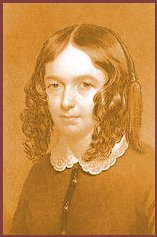
A Musical Instrument
(1855)

Elizabeth Barrett Browning is known principally as the author of Sonnets from the Portuguese, a series of love poems which has, over the past century and a half, become the most commonly printed book in English. But she wrote a great deal of other fine work, including the marvelously musical poem below, composed in 1855.
1855
What was he doing, the great god Pan, Down in the reeds by the river? Spreading ruin and scattering ban, Splashing and paddling with hoofs of a goat, And breaking the golden lilies afloat With the dragon-fly on the river. He tore out a reed, the great god Pan, From the deep cool bed of the river; The limpid water turbidly ran, And the broken lilies a-dying lay, And the dragon-fly had fled away, Ere he brought it out of the river. High on the shore sat the great god Pan, While turbidly flow'd the river; And hack'd and hew'd as a great god can With his hard bleak steel at the patient reed, Till there was not a sign of the leaf indeed To prove it fresh from the river. He cut it short, did the great god Pan (How tall it stood in the river!), Then drew the pith, like the heart of a man, Steadily from the outside ring, And notch'd the poor dry empty thing In holes, as he sat by the river. 'This is the way,' laugh'd the great god Pan (Laugh'd while he sat by the river), 'The only way, since gods began To make sweet music, they could succeed.' Then dropping his mouth to a hole in the reed, He blew in power by the river. Sweet, sweet, sweet, O Pan! Piercing sweet by the river! Blinding sweet, O great god Pan! Then sun on the hill forgot to die, And the lilies revived, and the dragon-fly Came back to dream on the river. Yet half a beast is the great god Pan, To laugh as he sits by the river, Making a poet out of a man: The true gods sigh for the cost and pain - For the reed which grows nevermore again As a reed with the reeds of the river. E.B. Browning, 1855
Elizabeth Barrett Browning also wrote other sonnets beside those sometimes embarassingly self-abasing but lovely ones in Sonnets from the Portuguese, such as the following, with its wonderfully musical lines:
Methinks we do as fretful children do, Leaning their faces on the windowpane To sigh the glass dark with their own breath's stain, And shut the sky and landscape from their view. And thus, alas! since God the maker drew A mystic separation 'twixt the twain, The life beyond us and our souls in pain, We miss the prospect we are called unto By grief we are fools to use. Be still and strong, O man, my brother; hold thy sobbing breath, And keep thy soul's large window free from wrong, That so when death's appointment issueth Thy vision may be clear to watch along The sunset consummation's lights of death. E.B. Browning, 1850
One guesses the following, which sounds rather pious at first, to have been startling to Browning's contemporaries with its sunny proclamation that pagan idols will be brought back in all their glory.
And o beloved voices, upon which Ours passionately call, because erelong Ye brake off in the middle of the song We sang together softly, to enrich The poor world with the sense of love, to witch The heart out of things evil, I am strong Knowing ye will not be lost for aye among The hills with last year's thrush. God keeps a niche In heaven to hold our idols, and albeit He brake them to our faces, and denied That our close kisses should stain their white, I know we shall behold them, raised, complete, The dust swept from their beauty, glorified New Memnons singing in the great God light. E.B. Browning, 1855